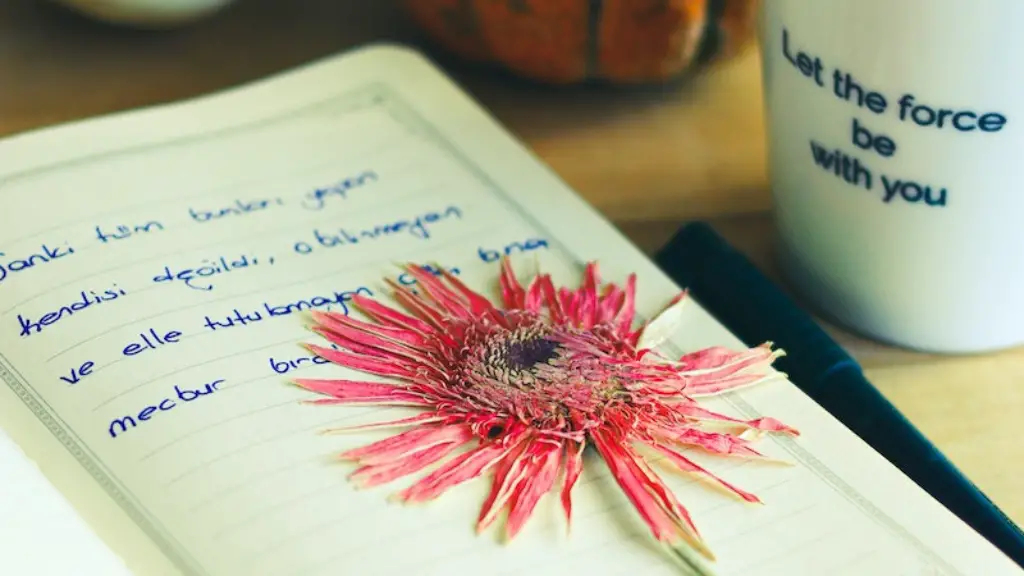Poetry is often viewed as an esoteric art form. It is a powerful, emotive source of insight and reflection that cannot be replicated in other forms of communication. By expressing powerful emotions through mediums such as verse and spoken word, poetry can be effectively used as a creative tool and form of communication in a variety of different contexts.
Poetry offers an often-unrivaled insight into complex personal and social issues. It can explore difficult topics such as mental illness, social injustice, personal identity, and emotion in ways that are both unique and profound. This is because the use of language in poetry can be incredibly potent and evocative, as it is capable of conveying complex emotions and ideas in short, succinct phrases.
At the same time, poetry can also be incredibly playful. It is capable of injecting wit and humor into relatable topics in a way that can inspire and fascinate. By using techniques such as metaphor and wordplay, poets can paint pictures of everyday life with surprising insight and humor. Poets are also uniquely positioned to observe and represent social norms and attitudes. Through their work, poets can inspire their readers to think differently about the world around them.
Perhaps the most valuable asset poetry offers is the key role it plays in preserving and examining a culture’s history. By providing a snapshot into a culture’s values and traditions, poetry gives readers an understanding of the past that cannot be obtained through any other form of communication. In addition to its historical value, poetry can also provide invaluable insight into a person’s present and future circumstances, through the insightful reflections of the poet.
Finally, poetry can also be a powerful tool in connecting people and generating empathy by illuminating the painful and joyous moments of life. By sharing one’s inner-most thoughts, poets can form strong bonds with their audience and promote understanding, compassion, and empathy. By providing a platform for expressing feelings that can be difficult to express in words, poetry is capable of truly transformative effects.
Educational Benefits
Moreover, poetry is an incredibly useful learning tool. By inspiring readers to engage with their emotions and explore their own experiences, it can be extremely beneficial in educational settings. For example, younger students may use poetry as a means of exploring their innermost thoughts and feelings, while older students can use poetry as a means of developing their critical thinking and communication skills. Teachers use poetry as a way to engage and foster creativity in their students. It can be used to broaden the horizons of students, to open up a conversation around important social and political issues, or even to spark their interest in other forms of literature.
In addition, poetry can often be beneficial in helping to develop language learning as well as literacy. Through the study and analysis of poetry, students are able to explore and understand the nuances and complexities of language, which can often prove difficult to master through traditional forms of teaching. As well as helping to build language skills, poetry can also be used to develop a student’s reading, writing, and critical thinking capacity.
Moreover, exploring poetry can also be beneficial in encouraging empathy and compassion in students. Through engaging with different poets and points of view, students can come to better understand life and the emotions of others. By using poetry to empathize with others, students can become more mindful, conscious, and appreciative of their own lives.
Healing Benefits
In addition to its educational benefits, poetry also has powerful healing potential. Through the combination of expressive language and emotional imagery, poetry can offer a unique form of healing and comfort. By writing down powerful emotions, readers can gain insight and understanding, while also relieving stress and anxiety. These healing effects can be amplified when the poem is read aloud, thereby connecting to other people and creating a sense of solidarity.
For example, many trauma survivors have found that writing and reciting poetry has helped them cope with their feelings of distress. Through the creative act of writing poetry, such individuals can help themselves to gain insight into their experiences and reach a state of better mental health. This is because the cathartic effects of writing and reciting poetry can provide an outlet for difficult feelings and the means to express emotions in ways that are not possible through speaking.
In addition to providing comfort, poetry can also be used to inspire thought and provoke change. Through the use of powerful language, poetry can be utilized as a tool for advocating reform and raising awareness of social issues. By encouraging readers to engage with their emotions and think critically, poets can be incredibly influential in shaping public opinion and inspiring action.
Mental Stimulation
Finally, poetry can also offer powerful mental stimulation. In fact, research carried out by the American Psychological Association has found that reading and interpreting poetry can help to improve a person’s mental agility. By encouraging readers to think abstractly and utilize their linguistic and emotional intelligence, poetry can be incredibly effective in helping to strengthen mental acuity and memory.
Moreover, poetry has been found to benefit mental health in a variety of other ways. For example, reading poetry has been linked to lower levels of stress, improved self-confidence, and in some cases, even improved physical health. In addition, by engaging with complex emotions, poetry can help to open up communication channels, allowing readers to gain insight into their own lives and the lives of others.
Altogether, poetry can help to promote wellbeing in a variety of different ways. Its powerful and emotive insights provide a unique platform for self-expression and exploration, and with its capacity for healing, advocacy, and mental stimulation, it is no wonder why poetry is so widely revered.
The Use of Rhyme in Poetry
A unique feature of poetry is its use of rhyme and meter. These devices are incredibly versatile and can be manipulated in a range of different ways to create unique and engaging pieces of writing. The use of rhyme and meter often serves to draw attention to certain words, ideas and emotions, which can be incredibly powerful in conveying the poet’s intended meaning.
The most common types of rhyme are internal and end rhymes. An internal rhyme is a word or phrase that rhymes within the line itself, for example, “The dragon, in his armor scales, sundered earth and sky”. End Rhymes, on the other hand, are words or phrases that rhyme at the end of lines of poetry, such as “Friendless and inexorably wise, she lived at loss and pain”.
Many types of poetic meter have been developed throughout the centuries, ranging from the iambic pentameter of Greek tragedy to the intricate syncopated rhythms of rap. These rhythmic forms serve to create a distinct musical quality that sets poetry apart from other forms of writing, and are often used to emphasize and draw attention to the poem’s meaning.
The Use of Symbolism in Poetry
In addition to its use of rhyme and meter, poetry is also known for its use of symbolism. Through the use of symbols, poets are able to communicate complex messages in succinct and vivid ways. Symbols can be used to represent larger themes and ideas, or to portray and explore complex emotions.
Often, symbols are used to represent different aspects of life. For example, the rising sun symbolizes a new day and the hope of a new beginning while a dark cloud may represent despair and sadness. In addition to the use of symbols, poets often use visuals such as color and imagery to evoke a particular emotion or to portray a scene. By combining these elements, poets can communicate multi-layered messages that engage and inspire readers.
Symbols can also be used to explore bigger concepts such as mortality and eternity. For example, the use of certain words such as ‘eternal’ can represent the idea that life is everlasting, while the use of darker symbols such as ‘tombstone’ can represent death. By combining symbols and other elements of poetry, poets can explore complex cultural and social issues in meaningful and engaging ways.
The malleability of Poetry
Many of the features that make poetry so powerful are due to its malleability. Unlike other forms of literature, poetry can be adapted and reshaped to suit an array of different contexts. Today, there is an abundance of styles and forms of poetry, ranging from the traditional sonnet to the more experimental works of postmodernism.
Poetry’s malleability also allows for elements of other genres to be incorporated into one’s work. For example, the fusion of music, dance and spoken word has become extremely popular in recent years, allowing poets to explore different ideas in innovative and creative ways. In addition, the rise of digital media has also provided poets with a range of new tools, such as video and animation, which can be used to further enhance the experience of reading and understanding a poem.
Furthermore, its malleability also means that poetry can be used in other disciplines. For example, the practice of psychopoetics takes elements from psychology and poetry and combines them to create a therapeutic setting in which personal and spiritual transformation can occur. Similarly, poetry can also be used to explore philosophical concepts and to frame debates about larger sociocultural issues.
The Value of Poetry
Overall, poetry is an incredibly valuable form of communication. Its powerful combination of language, emotion and understanding creates a platform in which readers can explore their inner-most thoughts and gain unique insight into the lives of others. In addition, the malleability of poetry allows it to be used in a variety of different contexts, making it applicable to a range of disciplines and activities.
At the same time, poetry can also be a powerful tool in advocating reform and inspiring change. By exploring difficult topics such as mental illness and social injustice in new and engaging ways, poets can start meaningful conversations and raise awareness of important social issues.
More than anything else, however, poetry offers a unique chance for personal exploration and self-expression. Through its creative and emotive approach, poetry can provide solace, comfort, and understanding. Ultimately, this is what makes poetry so special and why it continues to be so widely revered throughout the world.





